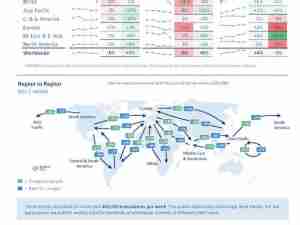Qantas Airways Ltd is looking past its record annual loss and predicting blue skies ahead, as a landmark change in Australian laws opens the door to foreign investment in the airline's international arm - its biggest headache.
A funding injection into its international division would allow Qantas to better compete on price and service offerings with rivals whom it says are bolstered by unlimited funding from wealthy state backers.
It would also support Qantas' plans to re-configure its aging fleet, invest resources in popular routes and further enlarge its global network, partly through its partnership with Emirates Airline.
Qantas said on Thursday that it expected to return to profit sometime in the current financial year. The surprisingly positive outlook gave the airline's shares their largest one-day percentage gain in a year.
The so-called 'Flying Kangaroo' has been bruised by high fuel costs, a strong Australian dollar, increasing international competition, and a domestic price war with arch-rival Virgin
Australia Holdings.
Qantas International has been the biggest drag on the airline's
earnings, with its loss for the year ended June 30 the largest among the carrier's divisions and doubling from a year earlier.
Aviation experts also point the finger at Chief Executive Alan Joyce and his management team, criticising ill-fated moves such as the rollout of its low-cost Jetstar subsidiary in an already crowded Asian market.
Joyce acknowledged that a record A$2.8 billion ($2.6 billion) annual net loss and an underlying loss before tax of A$646 million were "unacceptable", but vowed that "the worst is over."
The headline loss was almost entirely due to a A$2.6 billion non-cash writedown in the value of Qantas' fleet as it restructured to take advantage of new domestic laws allowing greater foreign investment.
In the biggest restructure since Qantas was privatised two decades ago, the airline is hiving off its international arm from its domestic unit. The move will allow a foreign airline to take as much as a 49 percent stake - a major change from the previous 35 percent limit.
"The changes to the Qantas Sale Act have removed a significant impediment for Qantas to be involved in long-term consolidation," Chief Financial Officer Gareth Evans told reporters in Sydney.
"By providing a separate subsidiary you give an option for a foreign investor to take equity directly in the international business," he said.
Still, analysts cautioned the airline against expecting a rush of foreign investors on its doorstep any time soon, with current alliance partner Emirates seen as the only likely candidate.
"I think the most logical partner would be Emirates because they've already got relations with them, but there is a lot of speculation that continues to occur and the business should just focus on improving its underlying operations," said David Liu, head of research at Above The Index Asset Management Pty Ltd.
Joyce said that foreign investment was a long-term strategy, and the focus remained on a A$2 billion turnaround program that includes stripping costs, freezing capacity and slashing 5,000 jobs.
"We are focused now in the short to medium term on the transformation program," he said. "We are not actively out there looking for an airline investor."
Qantas shares were up 7.3 percent in midafternoon trade at A$1.39, a three-month high and the biggest intraday gain in a year. The stock reached an all-time high of A$6.05 in 2007 before the global financial crisis hit.
Blue Skies
The headline A$2.8 billion loss overshadowed a smaller-than-expected underlying loss before tax of A$646 million, compared with a restated A$186 million profit a year earlier. Analysts had on average anticipated an underlying loss around A$750-770 million.
Joyce said there was a "clear and significant" easing of both international and domestic capacity growth and the airline expected "rapid improvement" in its financial performance with a return to underlying profit before tax in the first half of the current year.
Bell Potter analyst John O'Shea said there was evidence that domestic airfares have stabilised, which was a positive sign for the sector generally, but added that Qantas needed to commit to backing away from its price and capacity war with Virgin.
Analysts expect Virgin to post a A$250-270 million pre-tax loss when it reports
earnings on Friday, with both
airlines caught out by excess capacity in
global markets and moves by international carriers to increase capacity into
Australia.
"Looking at how bad the result is, maybe it will be a catalyst for them (Qantas) to actually behave more rationally in relation to pricing," O'Shea said.
Joyce said that Qantas would extend a freeze on increasing domestic capacity into the first half of the current year.
In stark contrast to the Australian carriers, Air New Zealand Ltd, which owns around 26 percent of Virgin Australia, on Wednesday reported a 44 percent jump in annual net profit to NZ$262 million. The New Zealand flag carrier also said it planned to significantly grow capacity this year.
Despite an investor push for major asset sales, Joyce said a review of its profitable Frequent Flyer loyalty scheme, which analysts value at up to A$2.5 billion, had concluded there was "insufficient justification" for a partial sale.
However, he said the airline had identified other potential asset sales, including airport terminals, property and land holdings. Any proceeds from such sales would be used to repay debt. (Reuters)
